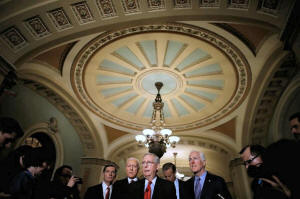|
Senate takes step toward passage of tax
bill, vote likely this week
 Send a link to a friend
Send a link to a friend
 [November 30, 2017]
By David Morgan and Susan Cornwell [November 30, 2017]
By David Morgan and Susan Cornwell
WASHINGTON (Reuters) - The U.S. Senate on
Wednesday took a step toward passage of tax legislation that is a top
White House priority, setting up a likely decisive vote later this week
even though it was unclear if the bill had enough Republican support to
become law.Republicans spent the day scrambling to reformulate the bill,
which aims to cut taxes on corporations, other businesses and many
individuals and families, to satisfy lawmakers worried about how much it
would balloon the U.S. budget deficit.
Stocks rallied on optimism it could pass, but obstacles remained,
including attempts to address the estimated $1.4 trillion that the bill
would add to the United States' $20 trillion national debt over 10
years.
Lawmakers voted 52-48 to begin formal debate, a step that could lead on
Thursday and Friday to a full vote on the bill. Republicans are eager to
pass the legislation, wanting something to show for their control of the
White House and both houses of Congress.

Republicans have a 52-48 majority in the 100-member Senate, giving them
enough votes to approve the bill if they can hold together. Without
Democratic support, Republicans can afford to lose no more than two of
their own votes.
President Donald Trump in a speech in Missouri on Wednesday, implored
members of his own party to get behind the effort, which would be his
first significant legislative achievement since taking office in
January.
"A vote to cut taxes is a vote to put America first again," Trump said,
adding the bill could "cost me a fortune" and that his wealthy friends
were not happy. "My accountants are going crazy right now. It's all
right. Hey look, I am president, I don't care. I don't care anymore."
Democrats say the tax cuts are a giveaway to corporations and the
wealthy at the expense of working Americans. Some Democrats have said
Trump and his children would gain from the bill, which would repeal the
estate tax on inherited wealth.
Among Americans aware of the Republican tax plan, 49 percent said they
were opposed, up from 41 percent in October, according to a Nov. 23-27
Reuters/Ipsos poll released on Wednesday. The latest online poll of
1,257 adults found 29 percent supporting the plan and 22 percent saying
they "don't know."
The sweeping tax package was developed over several months behind closed
doors by a small group of senior congressional and Trump administration
figures, with little input from many Republican lawmakers and no
involvement from Democrats.

A major sticking point in the Senate is how the bill deals with the
federal deficit and the national debt.
Senator Bob Corker, one of the few remaining fiscal hawks in the
Republican Party, wants to add a tax snap-back provision to the bill
that would raise taxes automatically if economic growth targets are not
hit in the future to offset a higher deficit.
That trigger proposal has become a target of growing criticism among
conservative Republicans and lobbyists, including interest groups
aligned with the billionaire industrialists Charles and David Koch, who
say the prospect of tax hikes could undermine future economic growth.
[to top of second column] |

Senate Majority Leader Mitch McConnell (R-KY) attends a press
conference following the Republicans weekly policy luncheon on
Capitol Hill in Washington, U.S., November 28, 2017. REUTERS/Carlos
Barria

"Iíd prefer not having it there. Weíre probably going to have one.
But Iíd prefer not having it," Republican Senate Finance Committee
Chairman Orrin Hatch told reporters.
'GETTING A DEAL DONE'
Republican Senator David Perdue, a businessman from Georgia, said
lawmakers could find common ground on a measure that delays any tax
hike for at least five years and spreads the prospective burden
among those who benefit from Republican tax cuts.
Senator Rob Portman, an Ohio Republican on the tax-writing Senate
Finance Committee, suggested such an approach may be gaining ground.
"It looks like the idea is part way through the first 10 years,
thereíd be an opportunity to see if the economic growth numbers are
performing as expected. And if not, there would be a trigger
mechanism over a 10-year period," Portman said.
Democrats and independents were trying to persuade nonpartisan
Senate officials to disqualify parts of the bill, including one to
allow drilling in the Arctic National Wildlife Refuge, as
impermissible under Senate rules, an aide said.
While some Republicans signaled determination to get the bill
passed, they still did not have the votes.

"Itís time for us to saddle up and ride. And Iím ready to go,"
Republican Senator John Kennedy of Louisiana told reporters.
Corker declined to say whether he would vote for the tax bill even
if Senate Republican leaders agree to the kind of trigger mechanism
he wants.
"I donít do conjecture," he told reporters, saying he could have
other concerns about the final legislation. "There are also
qualitative issues like the bill not getting any worse, that it
doesnít get more expensive."
(Additional reporting by Amanda Becker, Susan Heavey and Tim Ahmann
in Washington, Steve Holland in Missouri and Chris Kahn in New York;
Writing by Jeff Mason and Arshad Mohammed; Editing by Kevin
Drawbaugh and Peter Cooney)
[© 2017 Thomson Reuters. All rights
reserved.]
Copyright 2017 Reuters. All rights reserved. This material may not be published,
broadcast, rewritten or redistributed.
 |